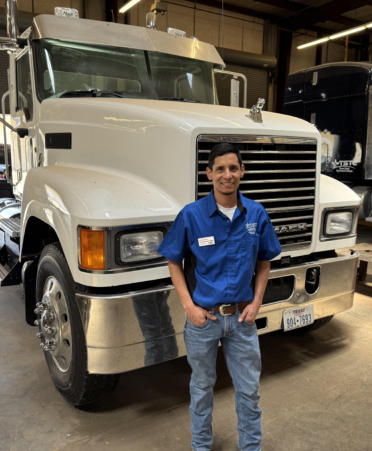(ABILENE, Texas) – While construction continues on Texas State Technical College’s Power and Mechanical Center in Abilene, the people who will lead the new programs are preparing themselves to train the next wave of the state’s workforce.
Alex DeLaGarza will be one of the instructors of the Diesel Equipment Technology program at the Abilene campus. The TSTC graduate is no stranger to Abilene or to Sweetwater, which also offers Diesel Equipment Technology.
DeLaGarza graduated from the Emergency Medical Services – EMT program in 2010 and was recruited to the U.S. Coast Guard, where he worked on marine diesel engines, which led him to return to TSTC. He earned an associate degree in Diesel Equipment Technology while he worked for his father’s automotive repair shop.
He is excited to be back at the college and to work in the state-of-the-art lab.
“It is an amazing facility,” DeLaGarza said of the new building in Abilene. “Sweetwater is an amazing facility. There are years of knowledge in these walls, and being here is a great honor.”
DeLaGarza provided his take on the importance of diesel technicians being able to study in the Big Country.
How will your hands-on experience shape the way you teach students?
Hands-on is probably the biggest way we do training out in the field. You get out there, get your hands on it and just have to learn how to do it. Sometimes you do have the training beforehand, which helps, with schools like TSTC being what really shapes that. Once they get into a dealership, they get that specialized training for each manufacturer.
How has the diesel industry changed since you first started, and how will you prepare students for those changes?
The biggest changes are going to be the electronics. There can be anywhere from one to 30 computers on most trucks.I am big on electronics and repairs. That is what I like to focus on. It is more of a challenge, and I like to figure it out. When you do figure something out like that, it is very rewarding.
What technologies or tools are today’s technicians expected to master?
Back to the electronics, that is going to be one of the bigger challenges. Taking apart things and putting them back together, they can learn that as they go. Learning to go where to get the resources and knowing how to do those things properly, that’s going to be on them to find that stuff. On the electrical side, you are utilizing everything from standard test lights to voltmeters, and it is getting more common to use those things.
How will you keep students motivated and connected to real-world applications?
Use the experience and teach them what they can do out in the field. The biggest thing is to show them that I care and I want to see them succeed, and get out there to get those good-paying jobs. I want them to tell people where they learned their skills.
What advice would you give someone thinking about entering the diesel technician field today?
Job security is first. Diesel is not going anywhere, no matter what anybody says. The industry is just growing. It grows as the population grows. It grows as innovation does.
How excited are you to be the first instructor for the Diesel Equipment Technology program in Abilene?
It’s exciting and scary at the same time. I never really thought I would be a teacher, but I have always liked training people by showing them the right way to do things.
Registration for TSTC’s fall semester is underway. For more information, go to tstc.edu.
